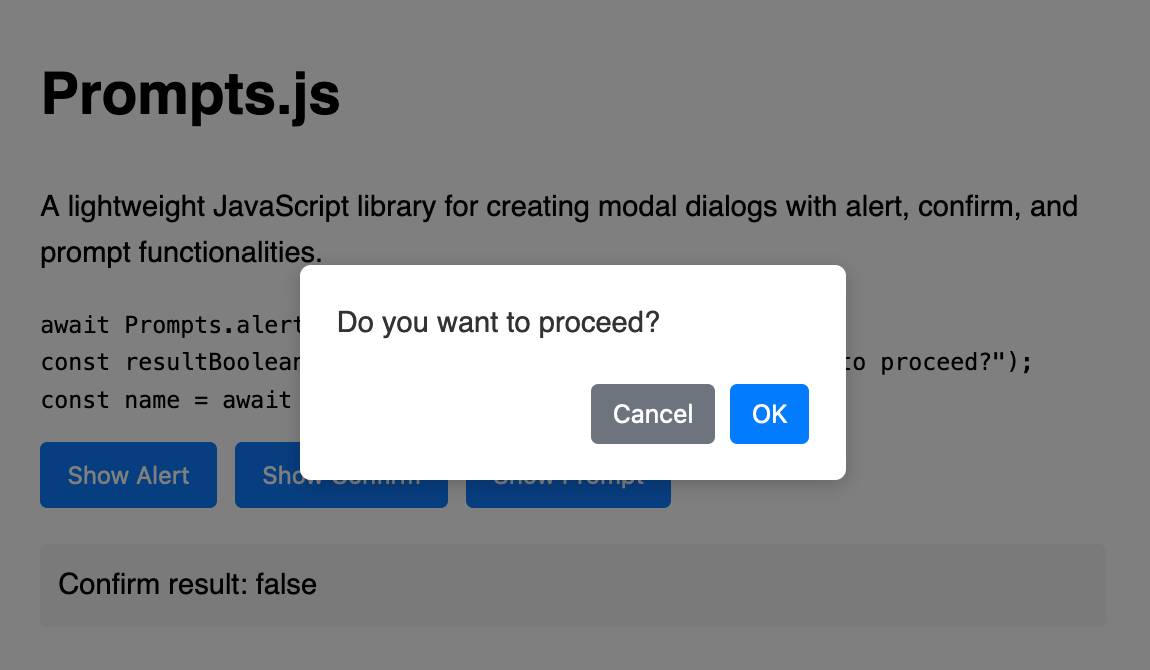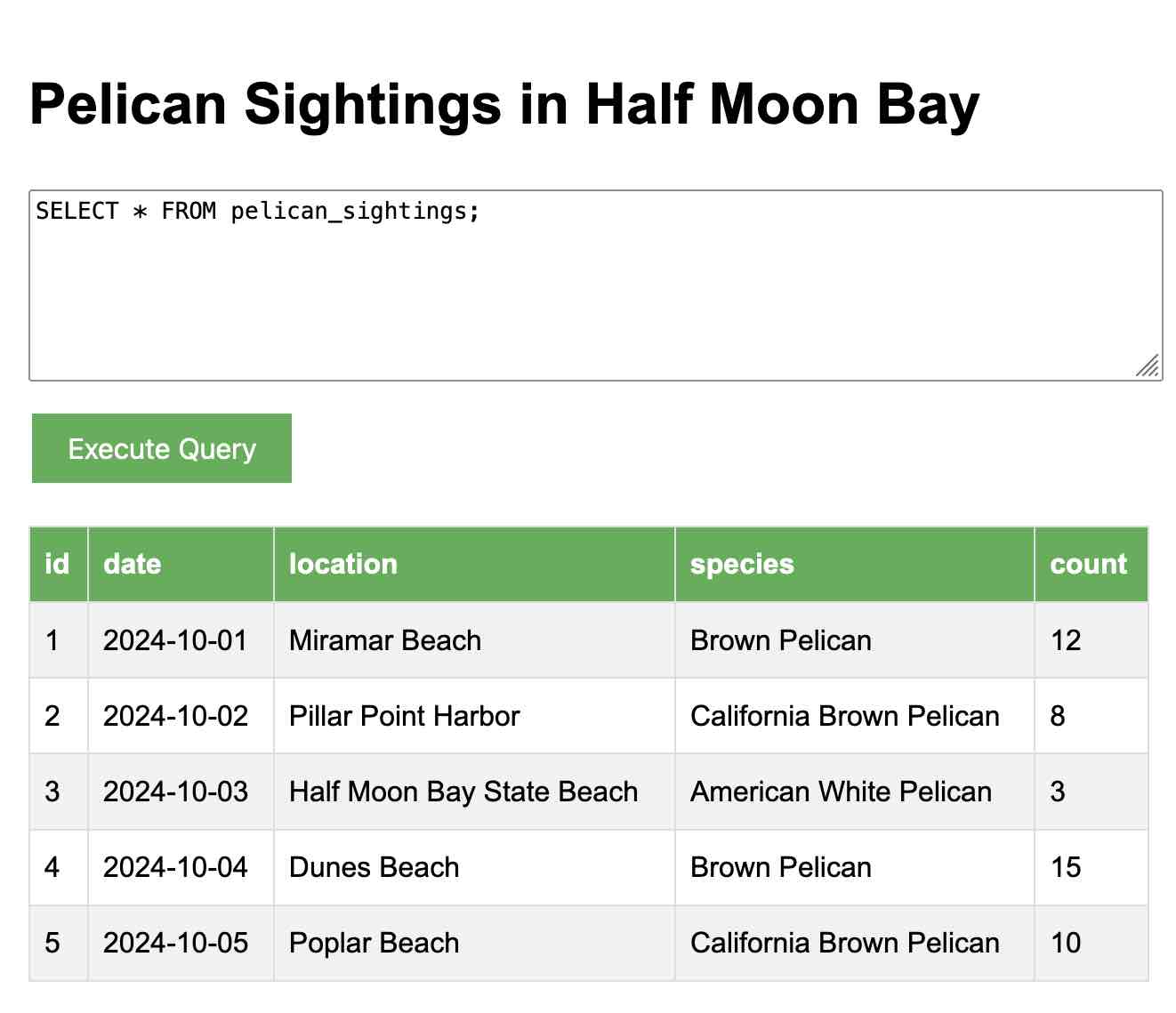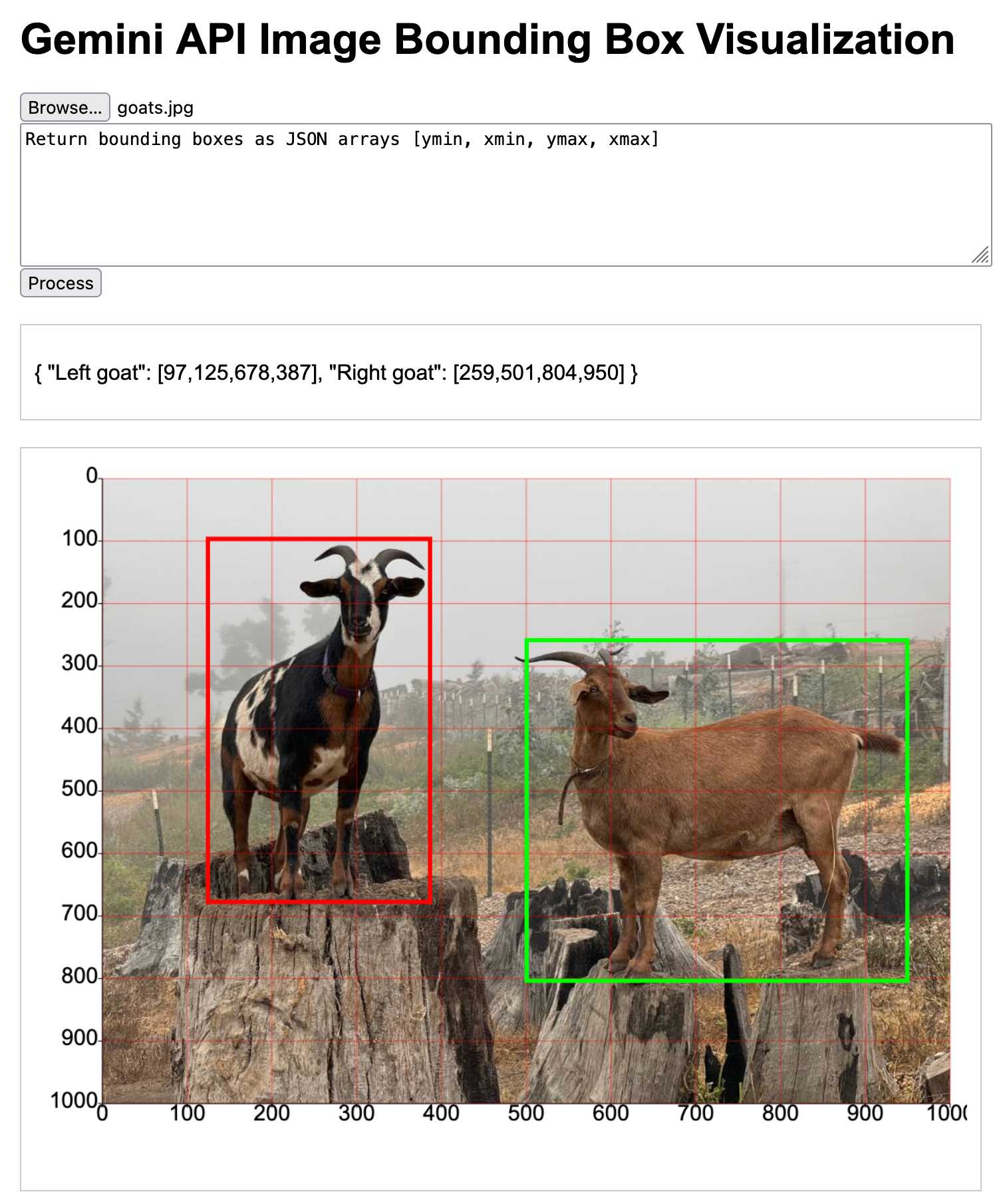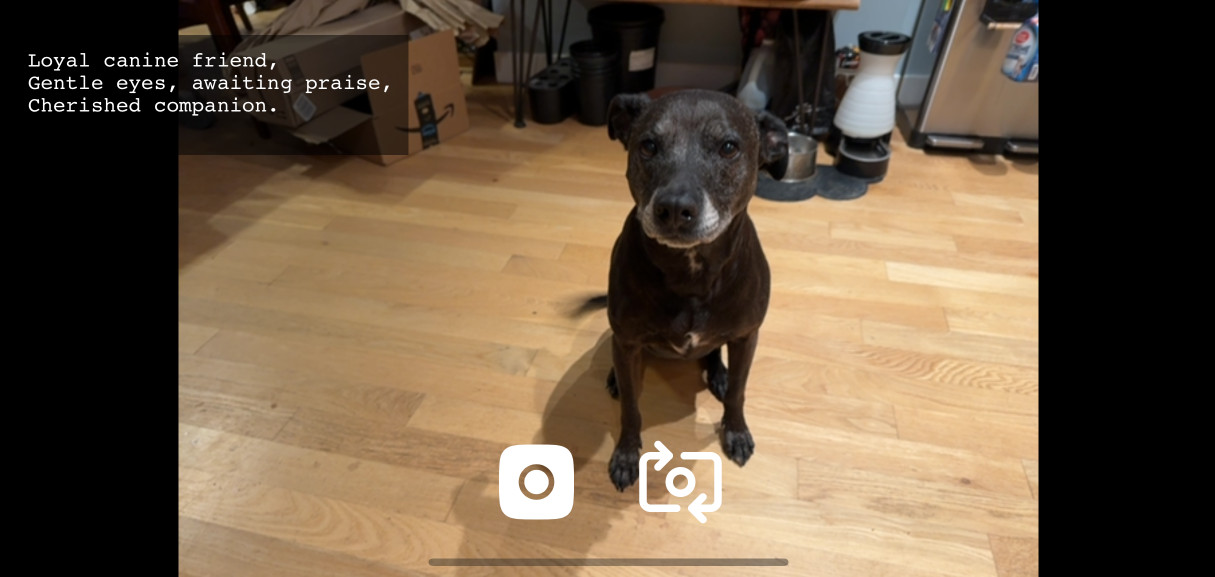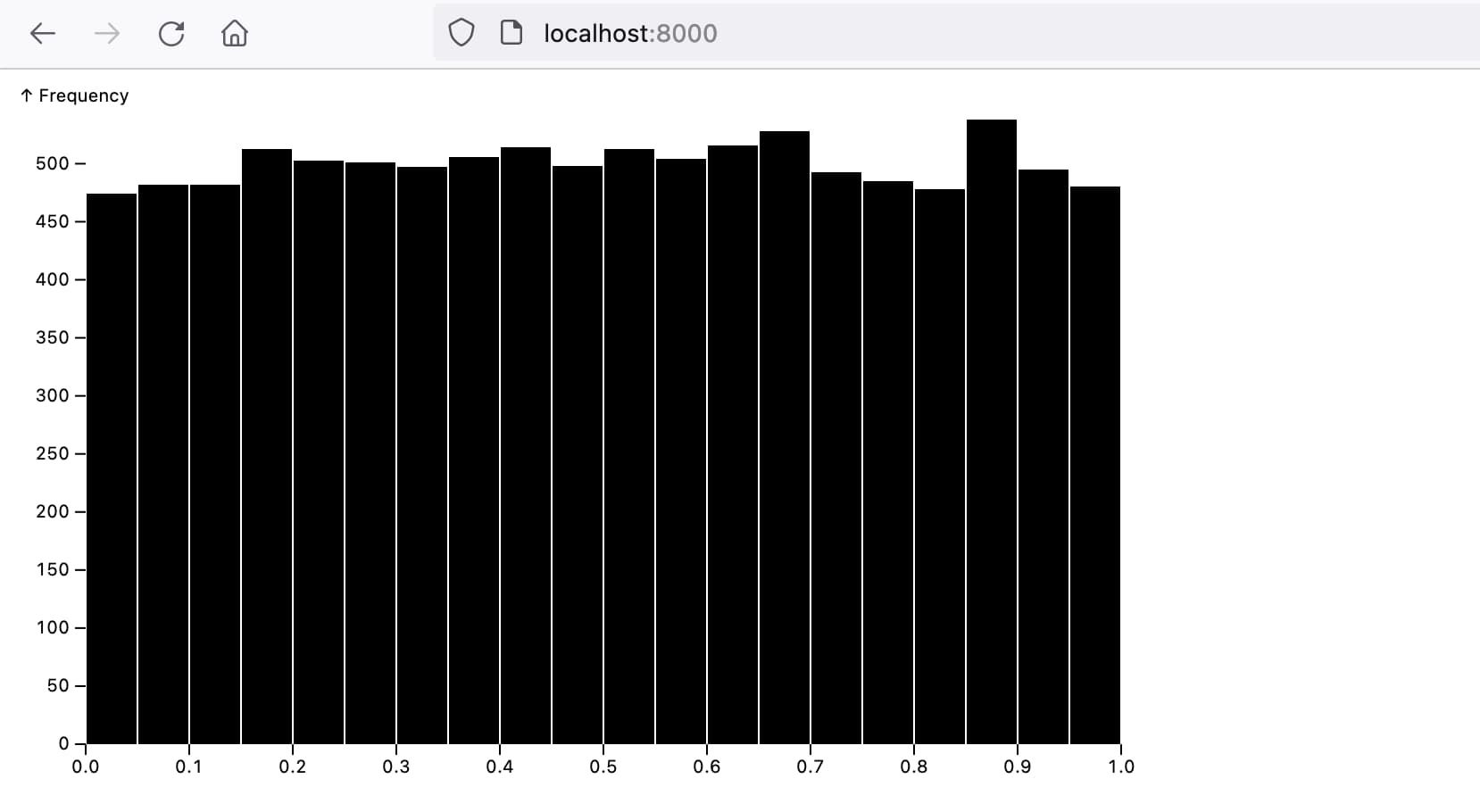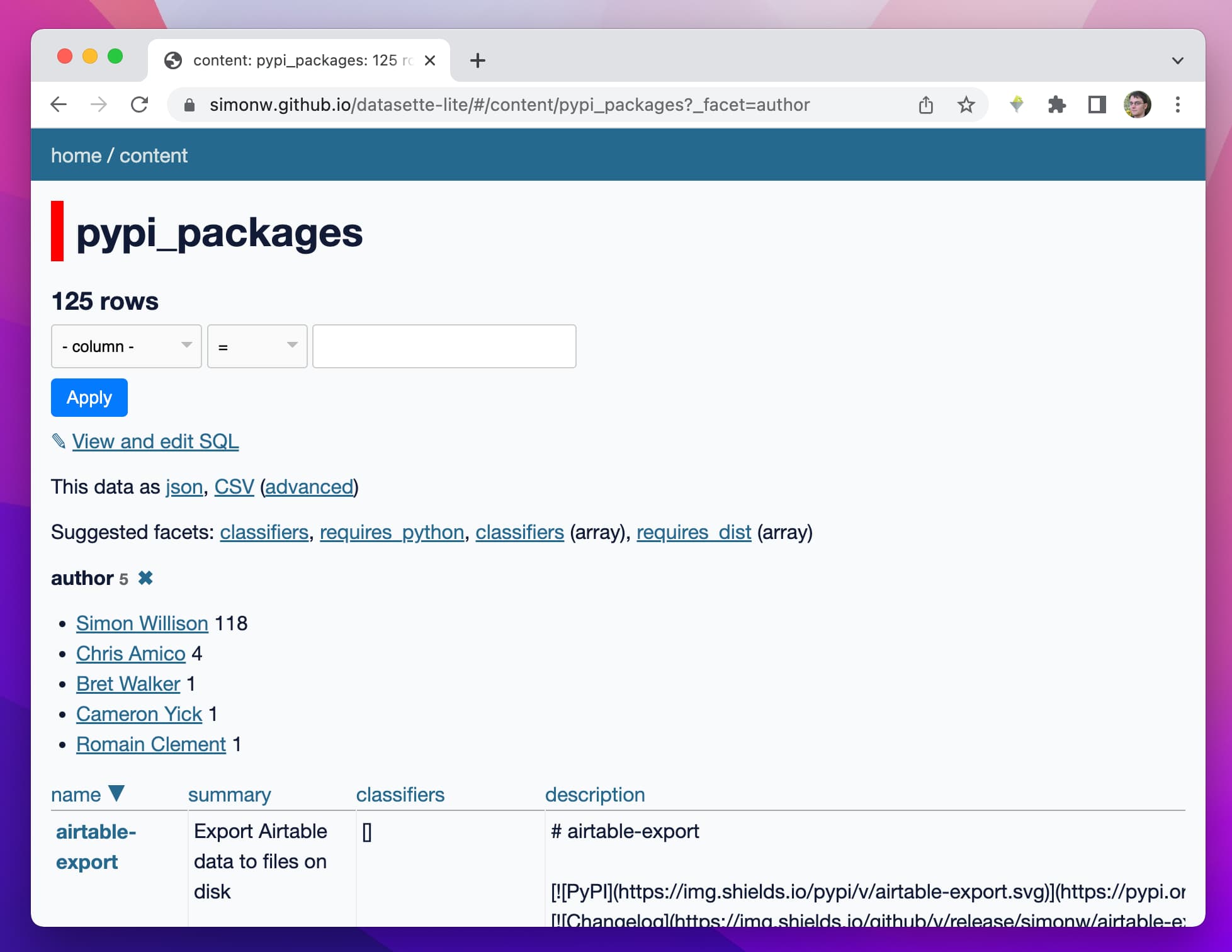Posts tagged projects, javascript
Filters: projects × javascript × Sorted by date
shot-scraper 1.8. I've added a new feature to shot-scraper that makes it easier to share scripts for other people to use with the shot-scraper javascript command.
shot-scraper javascript lets you load up a web page in an invisible Chrome browser (via Playwright), execute some JavaScript against that page and output the results to your terminal. It's a fun way of running complex screen-scraping routines as part of a terminal session, or even chained together with other commands using pipes.
The -i/--input option lets you load that JavaScript from a file on disk - but now you can also use a gh: prefix to specify loading code from GitHub instead.
To quote the release notes:
shot-scraper javascriptcan now optionally load scripts hosted on GitHub via the newgh:prefix to theshot-scraper javascript -i/--inputoption. #173Scripts can be referenced as
gh:username/repo/path/to/script.jsor, if the GitHub user has created a dedicatedshot-scraper-scriptsrepository and placed scripts in the root of it, usinggh:username/name-of-script.For example, to run this readability.js script against any web page you can use the following:
shot-scraper javascript --input gh:simonw/readability \ https://simonwillison.net/2025/Mar/24/qwen25-vl-32b/
The output from that example starts like this:
{
"title": "Qwen2.5-VL-32B: Smarter and Lighter",
"byline": "Simon Willison",
"dir": null,
"lang": "en-gb",
"content": "<div id=\"readability-page-1\"...My simonw/shot-scraper-scripts repo only has that one file in it so far, but I'm looking forward to growing that collection and hopefully seeing other people create and share their own shot-scraper-scripts repos as well.
This feature is an imitation of a similar feature that's coming in the next release of LLM.
Prompts.js
I’ve been putting the new o1 model from OpenAI through its paces, in particular for code. I’m very impressed—it feels like it’s giving me a similar code quality to Claude 3.5 Sonnet, at least for Python and JavaScript and Bash... but it’s returning output noticeably faster.
[... 1,119 words]MDN Browser Support Timelines. I complained on Hacker News today that I wished the MDN browser compatibility ables - like this one for the Web Locks API - included an indication as to when each browser was released rather than just the browser numbers.
It turns out they do! If you click on each browser version in turn you can see an expanded area showing the browser release date:
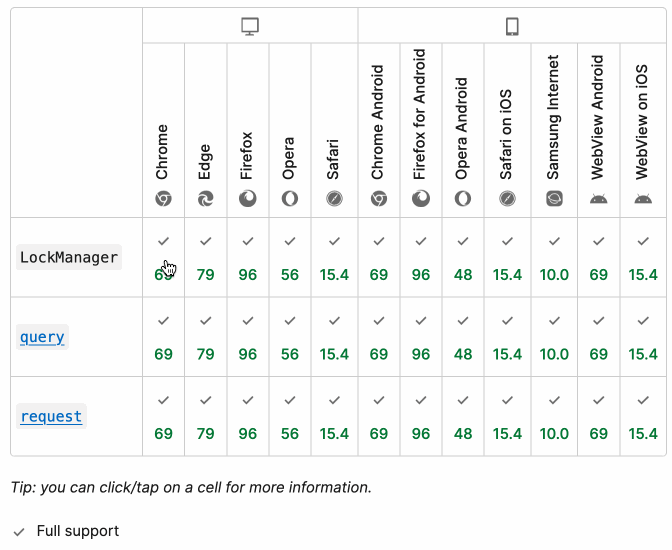
There's even an inline help tip telling you about the feature, which I've been studiously ignoring for years.
I want to see all the information at once without having to click through each browser. I had a poke around in the Firefox network tab and found https://bcd.developer.mozilla.org/bcd/api/v0/current/api.Lock.json - a JSON document containing browser support details (with release dates) for that API... and it was served using access-control-allow-origin: * which means I can hit it from my own little client-side applications.
I decided to build something with an autocomplete drop-down interface for selecting the API. That meant I'd need a list of all of the available APIs, and I used GitHub code search to find that in the mdn/browser-compat-data repository, in the api/ directory.
I needed the list of files in that directory for my autocomplete. Since there are just over 1,000 of those the regular GitHub contents API won't return them all, so I switched to the tree API instead.
Here's the finished tool - source code here:
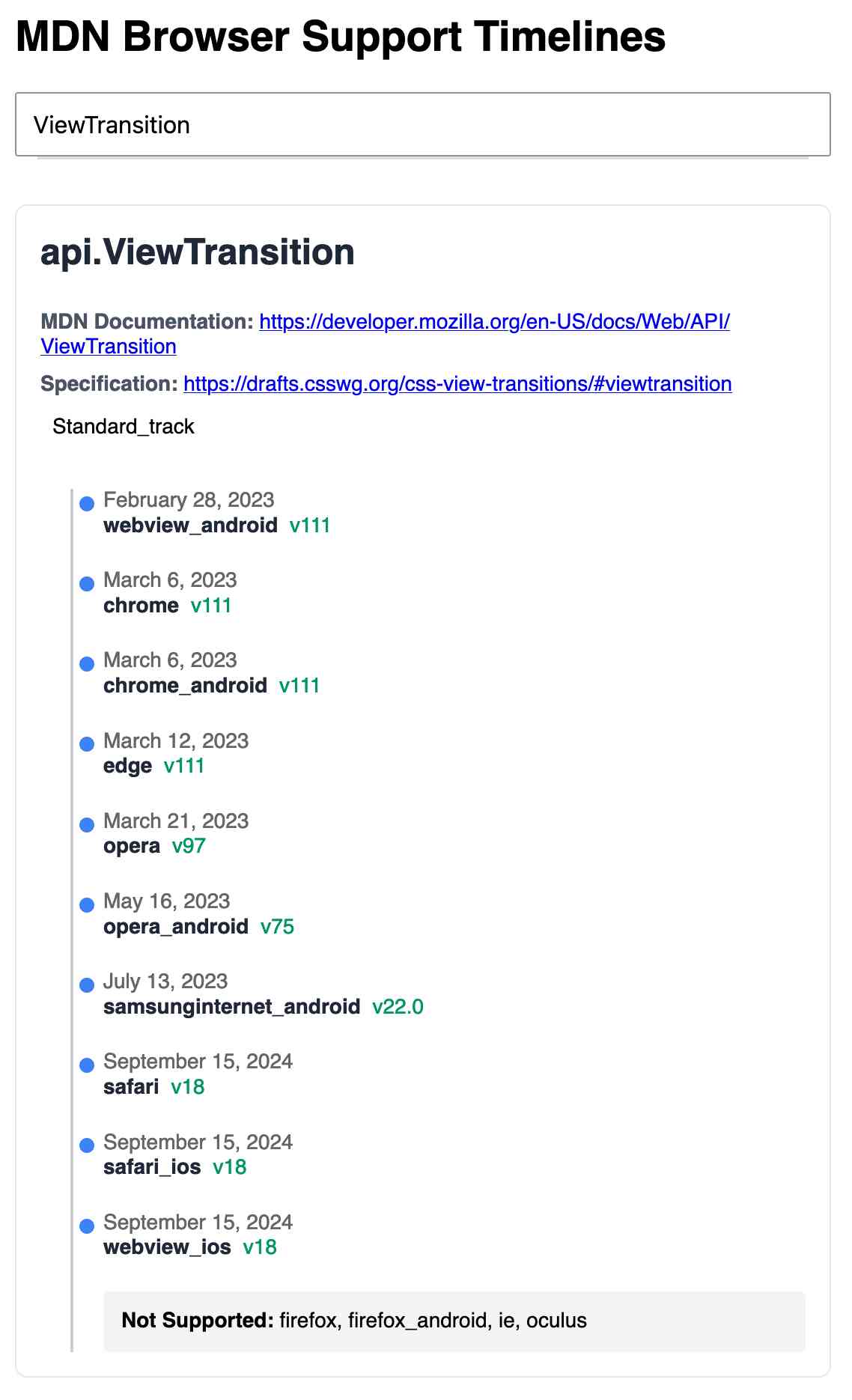
95% of the code was written by LLMs, but I did a whole lot of assembly and iterating to get it to the finished state. Three of the transcripts for that:
- Web Locks API Browser Support Timeline in which I paste in the original API JSON and ask it to come up with a timeline visualization for it.
- Enhancing API Feature Display with URL Hash where I dumped in a more complex JSON example to get it to show multiple APIs on the same page, and also had it add
#fragmentbookmarking to the tool - Fetch GitHub API Data Hierarchy where I got it to write me an async JavaScript function for fetching a directory listing from that tree API.
Everything I built with Claude Artifacts this week
I’m a huge fan of Claude’s Artifacts feature, which lets you prompt Claude to create an interactive Single Page App (using HTML, CSS and JavaScript) and then view the result directly in the Claude interface, iterating on it further with the bot and then, if you like, copying out the resulting code.
[... 2,273 words]Dashboard: Tools. I used Django SQL Dashboard to spin up a dashboard that shows all of the URLs to my tools.simonwillison.net site that I've shared on my blog so far. It uses this (Claude assisted) regular expression in a PostgreSQL SQL query:
select distinct on (tool_url)
unnest(regexp_matches(
body,
'(https://tools\.simonwillison\.net/[^<"\s)]+)',
'g'
)) as tool_url,
'https://simonwillison.net/' || left(type, 1) || '/' || id as blog_url,
title,
date(created) as created
from contentI've been really enjoying having a static hosting platform (it's GitHub Pages serving my simonw/tools repo) that I can use to quickly deploy little HTML+JavaScript interactive tools and demos.
Calling LLMs from client-side JavaScript, converting PDFs to HTML + weeknotes
I’ve been having a bunch of fun taking advantage of CORS-enabled LLM APIs to build client-side JavaScript applications that access LLMs directly. I also span up a new Datasette plugin for advanced permission management.
[... 2,050 words]Gemini Chat App. Google released three new Gemini models today: improved versions of Gemini 1.5 Pro and Gemini 1.5 Flash plus a new model, Gemini 1.5 Flash-8B, which is significantly faster (and will presumably be cheaper) than the regular Flash model.
The Flash-8B model is described in the Gemini 1.5 family of models paper in section 8:
By inheriting the same core architecture, optimizations, and data mixture refinements as its larger counterpart, Flash-8B demonstrates multimodal capabilities with support for context window exceeding 1 million tokens. This unique combination of speed, quality, and capabilities represents a step function leap in the domain of single-digit billion parameter models.
While Flash-8B’s smaller form factor necessarily leads to a reduction in quality compared to Flash and 1.5 Pro, it unlocks substantial benefits, particularly in terms of high throughput and extremely low latency. This translates to affordable and timely large-scale multimodal deployments, facilitating novel use cases previously deemed infeasible due to resource constraints.
The new models are available in AI Studio, but since I built my own custom prompting tool against the Gemini CORS-enabled API the other day I figured I'd build a quick UI for these new models as well.
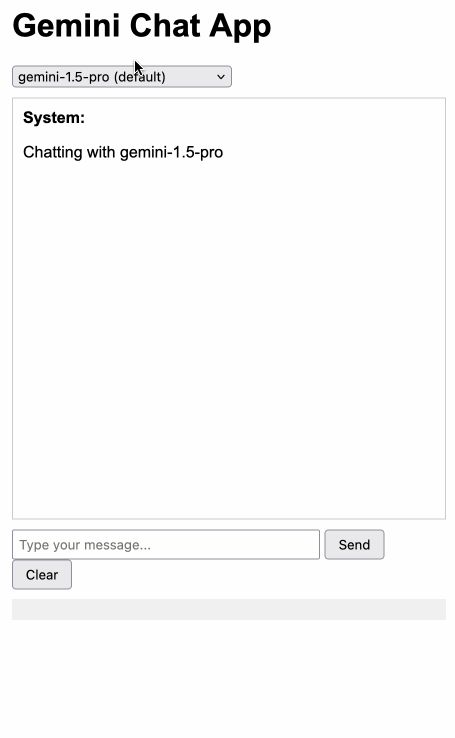
Building this with Claude 3.5 Sonnet took literally ten minutes from start to finish - you can see that from the timestamps in the conversation. Here's the deployed app and the finished code.
The feature I really wanted to build was streaming support. I started with this example code showing how to run streaming prompts in a Node.js application, then told Claude to figure out what the client-side code for that should look like based on a snippet from my bounding box interface hack. My starting prompt:
Build me a JavaScript app (no react) that I can use to chat with the Gemini model, using the above strategy for API key usage
I still keep hearing from people who are skeptical that AI-assisted programming like this has any value. It's honestly getting a little frustrating at this point - the gains for things like rapid prototyping are so self-evident now.
Claude’s API now supports CORS requests, enabling client-side applications
Anthropic have enabled CORS support for their JSON APIs, which means it’s now possible to call the Claude LLMs directly from a user’s browser.
[... 625 words]download-esm: a tool for downloading ECMAScript modules
I’ve built a new CLI tool, download-esm, which takes the name of an npm package and will attempt to download the ECMAScript module version of that package, plus all of its dependencies, directly from the jsDelivr CDN—and then rewrite all of the import statements to point to those local copies.
[... 1,240 words]Datasette Lite: a server-side Python web application running in a browser
Datasette Lite is a new way to run Datasette: entirely in a browser, taking advantage of the incredible Pyodide project which provides Python compiled to WebAssembly plus a whole suite of useful extras.
[... 4,800 words]Render Markdown tool (via) I wrote a quick JavaScript tool for rendering Markdown via the GitHub Markdown API—which includes all of their clever extensions like tables and syntax highlighting—and then stripping out some extraneous HTML to give me back the format I like using for my blog posts.
datasette-search-all: a new plugin for searching multiple Datasette tables at once
I just released a new plugin for Datasette, and it’s pretty fun. datasette-search-all is a plugin written mostly in JavaScript that executes the same search query against every searchable table in every database connected to your Datasette instance.
[... 819 words]owlsnearme source code on GitHub. Here’s the source code for our new owlsnearme.com project. It’s a single-page React application that pulls all of its data from the iNaturalist API. We built it this weekend with the SuperbOwl kick-off as a hard deadline so it’s not the most beautiful React code, but it’s a nice demonstration of how React (and create-react-app in particular) can be used for rapid development.
getlatlon.com commit dae961a... I’ve finally added an OpenStreetMap tab to getlatlon.com—here’s the diff, it turns out adding a custom OpenStreetMap layer to an existing Google Maps application only takes a few lines of boilerplate code.
webhook-relay. Another of my experiments with Node.js: webhook-relay is a self-contained queue and webhook request sending agent. Your application can POST to it specifying a webhook alert to be sent off, and webhook-relay will place that request in an in-memory queue and send it on its own time, avoiding the need for your main application server to block until the outgoing request has been processed.
dogproxy. Another of my experiments with Node.js—this is a very simple HTTP proxy which addresses the dog pile effect (also known as the thundering herd) by watching out for multiple requests for a URL that is currently “in flight” and bundling them together.
Oscars 2009: the interactive results | guardian.co.uk. My latest project for the Guardian, put together on very short notice. Updates live as the results are announced, and allows Twitter users to vote on their favourite for each category by sending a specially formatted message to @guardianfilm—jQuery and Ajax polling against S3 under the hood.
lightningtimer.net. I'm fed up of having to dig out or knock up a timer script every time I manage lightning talks, so I've given one a domain name. You can use lightningtimer.net/#90 to set a different start time for the counter.
Update March 25th 2025: I rescued an old copy of this from the Internet Archive and re-published it to tools.simonwillison.net/lightning-timer.
Tweetersation. Nat and my latest side project: a JSONP API powered tool to more easily follow conversations between people on Twitter, by combining their tweets in to a single timeline.
json-tinyurl. Because sometimes you want to be able to create a shorter version of a URL directly from JavaScript without hosting your own server-side proxy.
Get Lat Lon now has a “Get my location (by IP)” button. It took all of five minutes to add using the new google.loader.ClientLocation API. The button is only visible if your location can be resolved.
jsontime. Nat and I threw this together this morning—it runs on Google App Engine and exposes Python’s pytz timezone library over JSONP.
getElementsBySelector()
Inspired by Andy, I decided to have a crack at something I’ve been thinking about trying for a long time. document.getElementsBySelector is a javascript function which takes a standard CSS style selector and returns an array of elements objects from the document that match that selector. For example:
Image Drag bookmarklet
I got a good response to yesterday’s call for help on finding an HTML element’s co-ordinates on a page. I ended up using PPK’s findPos functions which seemed to do the trick just fine.
[... 338 words]